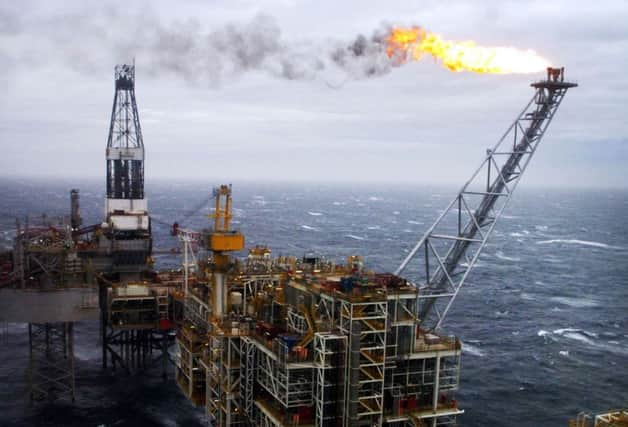Comment: Would iScotland have sufficient oil?


The answer to this question is central to the outcome of the referendum. Consequently, different answers have been forthcoming from the “yes” and “no” camps. There are, of course, uncertainties is predicting viable oil reserves. If the price of oil rises then the economic reserves of oil available also rise.
The converse applies when oil prices fall. In other words, the only reserves of oil that are meaningful are commercial reserves. If a government imposes a high or uncertain tax regime on its oil industry then that reduces the incentive for the industry to invest in finding new oil reserves.
Arguably, that has been the case over the years in the UK.
Advertisement
Hide AdAdvertisement
Hide AdCommercial reserves are usually called proved reserves. Traditionally, the ratio of a country’s proved reserves to its annual production of oil gives a rough guide to the remaining life of the reserves, assuming no further reserves are discovered.
The UK’s life of reserves figure has not changed dramatically over the years at approximately nine years life. But no one ever assumes that new reserves will not be found, at least that has been the case up to the current debate on the size of remaining oil reserves in the North Sea.
The one certainty is that worldwide oil consumption growth will continue. The average annual increase has been approximately 1.4 per cent and in 2013 this equated to an increase of 1.4 million barrels per day (BP Statistical Review of World Energy June 2014).
Oil reserves worldwide are not in short supply, but the ability of some key non-western aligned countries to enjoy the fruits of their oil wealth is very restricted for reasons that can be debated ad infinitum such as politics and Western economic interests.
For example, in 2013 there were falls in production from OPEC countries of 600,000 barrels per day. Given the current worldwide political unrest, that situation will continue for the foreseeable future. As a consequence, oil prices will remain high.
The incentive for additional exploration and production in as yet unexplored areas of the North Sea, for example, to the west of Scotland including the Sea of the Hebrides must therefore be a lucrative venture for the oil industry.
Consequently, the healthy 16 billion barrels or so of oil equivalent figures now widely accepted by all campaigners in the referendum debate (apart from the ludicrously pessimistic forecasts from the Office for Budgetary Responsibility) as being economically exploitable from existing discoveries is surely an understatement of the future potential of North Sea production.
Professor Alex Kemp and Linda Stephen have modelled future production based on oil prices at $90 per barrel and arrived at future production figures up to 2050 of between 15-16.5 billion barrels of oil equivalent. Since current oil prices are higher than $90 and likely to rise and as improvement in technology continue then “..the ultimate potential of 24 billion barrels of oil equivalent foreseen by Oil and Gas UK appears plausible” (Kemp and Stephen, 2014).
Advertisement
Hide AdAdvertisement
Hide AdThis outcome is all the more probable given the truly brilliant and innovative approach of the North Sea oil industry towards finding and exploiting reserves. Our oil industry is second to none in leading the way not only in developing new technology but also in inculcating a culture of mutual support amongst North Sea operators.
For example, North Sea operators have developed and use a series of standard oil accounting procedures (SOAPS, basically guidelines for management accounting practice) that standardise accounting practice across the industry. The use of SOAPs not only results in efficiency gains all round but also they are used to underpin accounting procedures used in joint venture agreements.
It is exactly this type of team approach that was advocated in Sir Ian Wood’s UKCS Maximising Recovery Review published on 24 February 2014 that is likely to push production up towards the upper range of 24 billion barrels of oil recoverable from existing fields.
In summary, the oil game focused in Scottish waters is still very much alive and is a current asset to the UK and to Scotland. The recent Scottish government report North Sea – two Futures report that compares how Norway exploited its oil reserves compared to the approach of the UK to its reserves gives real food for thought with its observations such as:
• Norway has established an oil fund that now worth over £500 billion, equivalent to £100,000 for every Norwegian citizen. The UK has not established an oil fund
• UK general net debt now stands at around 81 per cent of GDP. In contrast, Norway has accumulated public sector net assets equal to 172 per cent of GDP
There is no question that had Scotland been an independent country in 1975, say, that Scotland would be extremely wealthy now and there would be no national debt. That aside, the weight of evidence is that the UK government has failed to invest the harvest from the North Sea oil for future generations.
Clearly, it had other spending priorities and a propensity to act as if we are a smaller version of the U.S. and arbiter of right and wrong in other countries affairs.
Advertisement
Hide AdAdvertisement
Hide AdWould an independent Scotland look after the remaining resources better than the current UK government? That is for voters to decide.
But the weight of evidence supports the case that future oil revenues from the North Sea will be sufficient to support the SNP’s spending plans.